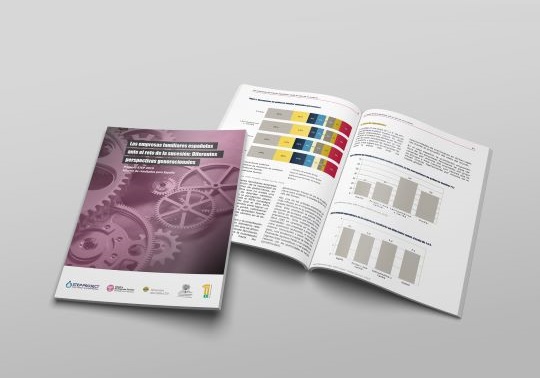
November 26, 2020. More than 70% of current family business leaders admit not to have a succession plan. Of the 30% of leaders with a formal succession plan, they believe that this increases the possibility for the current manager to reflect on their plans for the future.
Spanish family businesses are in the international average for succession plans (28% in Spain, as in Europe and Latin America, compared to 30% globally).
The study also shows that Spanish family businesses face these processes with a strong orientation towards the structuring of family government. This can help guide and consensual succession processes and encourage family involvement and involvement in future stages of the business project However, they are worse equipped with corporate governance structures and mechanisms (board of directors, existence of external advisors, etc.), which are also key to channel the transition in management.
These are some of the conclusions derived from the study developed on how family businesses face succession, with particular attention to the different generational perspectives, by researchers from the Chair of Family Business of the University of Valencia, the Chair of Family Business and Business Creation of the Abat Oliba CEU University and the University of Extremadura, who are part of the international step project consortium (Successful Transgenerational Entrepreneurship Practices) (https://thestepproject.org/).
"We are very proud to see the Spanish chapter of the 2019 STEP-KPMG Global Family Business Survey being released. The last months have shown us that everything could change quickly. Having a good plan and empowering the right people is nowadays more urgent than ever. At STEP Project we collaboratively research transgenerational entrepreneurship in order to produce highly relevant, applied research which makes a tangible difference to the business families and their stakeholders around the world”
Andrea Calabró. Global Academic Director of STEP Project Global Consortium
These research groups work closely with the associations of family companies in their reference areas: AVE (Valencian Association of Entrepreneurs), ASCEF (Catalan Family Business Association) and AEEF (Extreme Family Business Association).
The study carried out by the STEP project at the global level has addressed how generational and social changes are influencing the way succession processes are approached in family businesses around the world.
It has been supported by more than 40 universities from different parts of the world, and more than 1,800 family businesses from 33 countries from 5 geographical regions (Europe and Central Asia; North America; Latin America and the Caribbean; Asia-Pacific; Middle East and Africa). Based on this research, the Spanish partners of the project have produced a national report, which reflects the situation in Spain, based on the data provided by 113 Spanish family companies. The study compares the results of the Spanish case with the global sample as a whole, as well as with the sample of European companies and with a selection of European countries for which sufficient information is available.
The Spanish family companies participating in this study belong mostly to the services sector (69%), 15% of them carry out their activity in the primary sector and 16% in the secondary sector, and are slightly larger than national averages. In addition, the leaders of participating family businesses are characterized by an average age of 45 years and belong mostly to business families of 2nd generation or later.
The results of the study indicate that 28% of Spanish family businesses plan foresees a succession plan. Viewed from another angle, more than 70% of current family business leaders admit not to have a succession plan. These figures are very similar for European leaders, Latin Americans and, as a whole, for those of the entire global sample of this study (Figure 13).
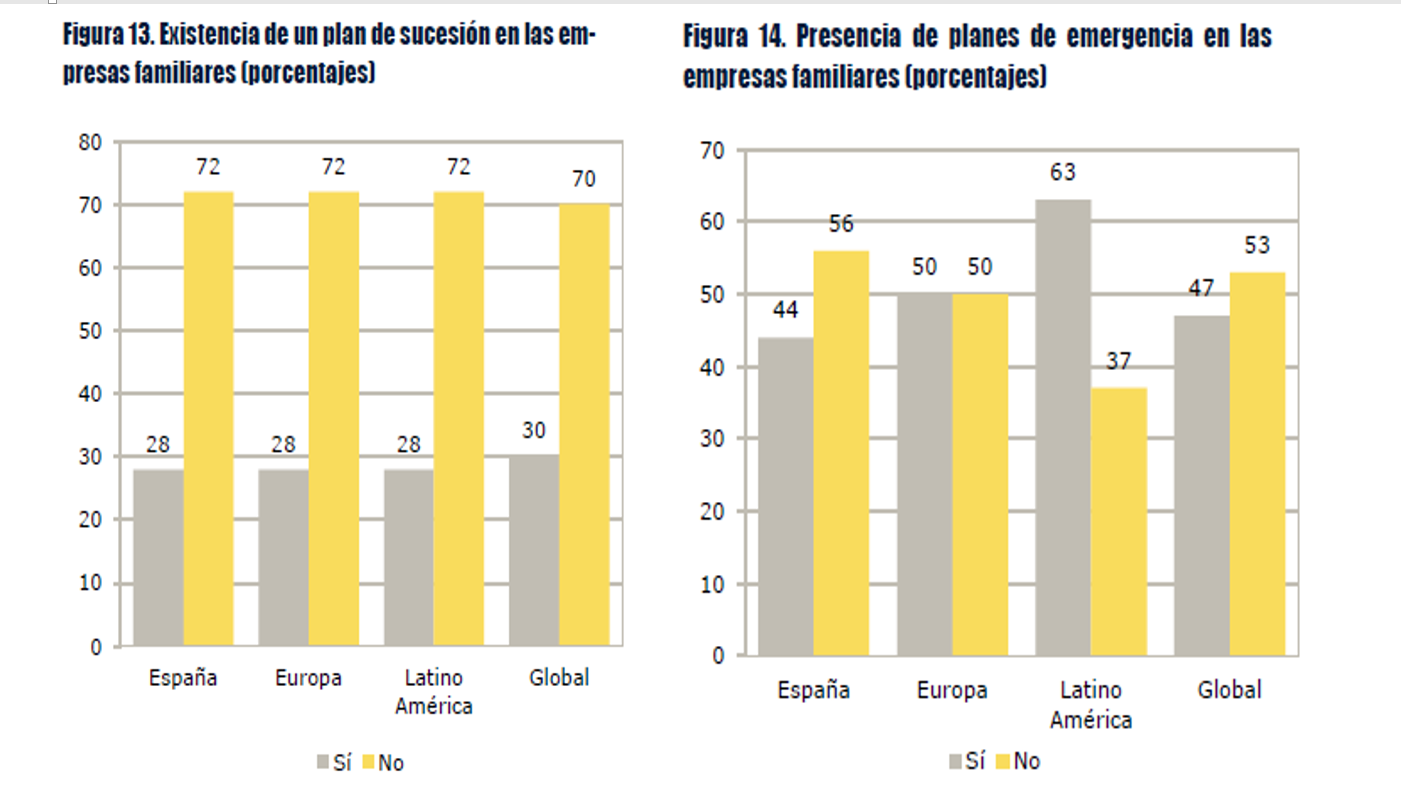

Having a succession plan in place suggests that family business leaders have become aware of the importance of preparing the succession process in advance, and that this process can be developed through reasoned criteria and in a professional manner.
On the other hand, when asked whether the company has an emergency plan in the event of an unexpected event forcing the current manager to be replaced, the differences between those who do have him and those that do not have it are not, are significantly reduced (Figure 14). In Spain, 44% of leaders say they do have an emergency plan, while 56% say they don't have any kind of plan.
With regard to the attitude of the leaders to prepare their retirement, in Spain, 37% of the leaders interviewed claim to have a premeditated plan regarding their retirement. If we compare the data with those of other EU countries we can see that in Germany this figure amounts to 60%; while Italy is the country where retirement is least planned, with a representation of 13%. (Figure 18)
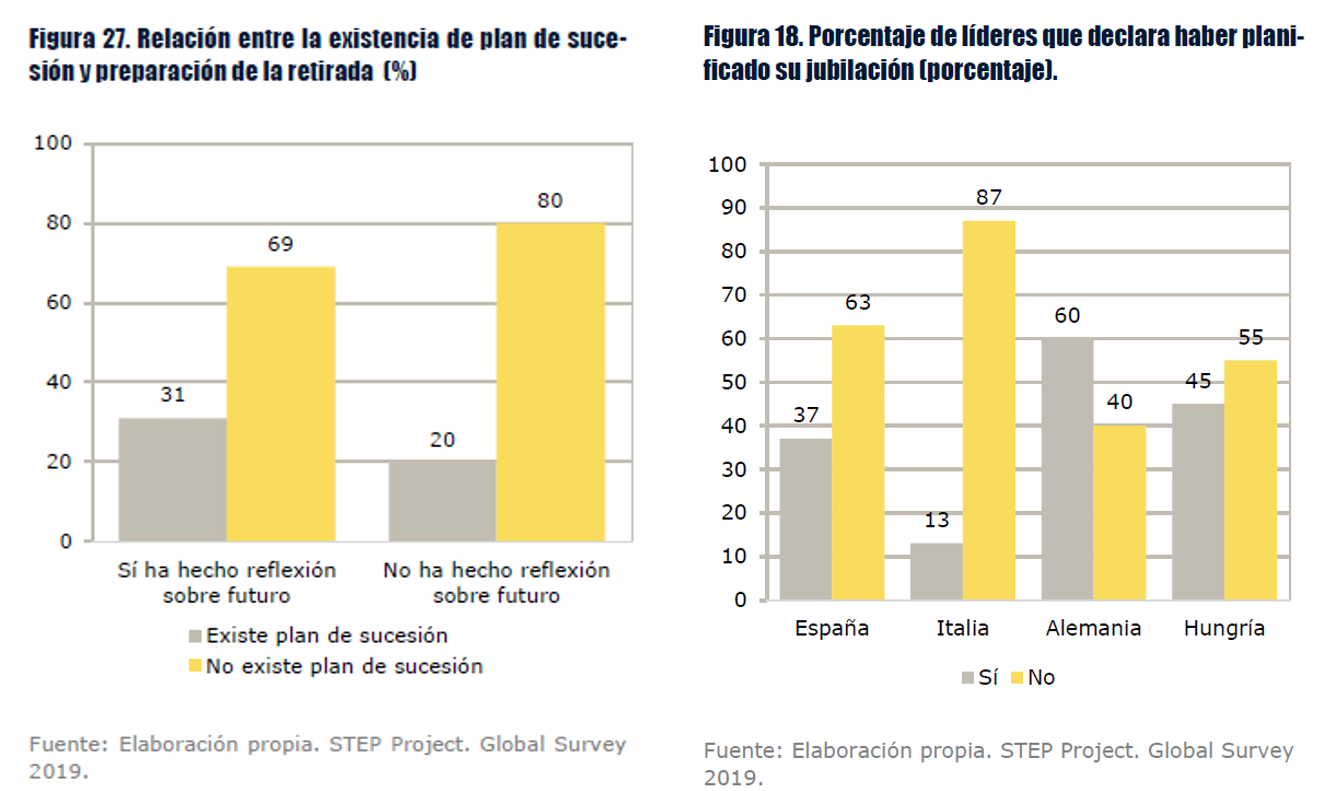
It is also noted that the existence of a formal succession plan in the company increases the possibility of the current manager reflecting on his plans for the future (the percentage of managers preparing for his withdrawal is 11 points higher). This contributes to individual preparedness and avoiding entrenchments that hinder succession processes. (Figure 27)
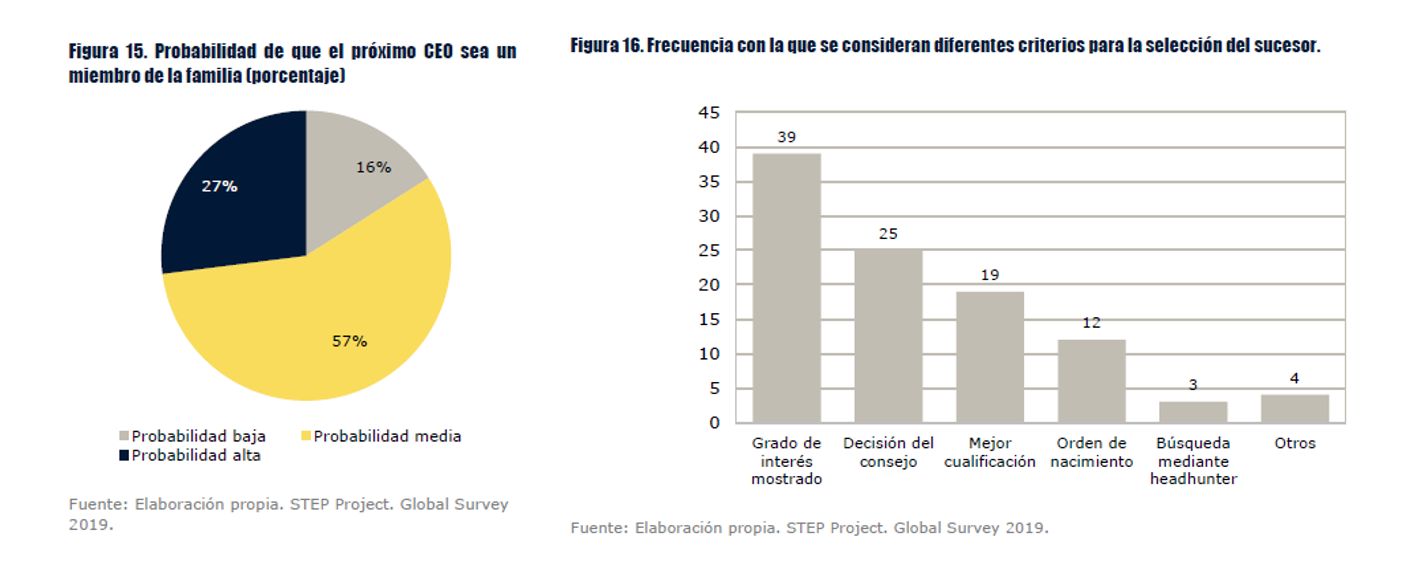
As for the intentions with respect to the profile of the successor, 84% of companies consider the probability that the successor is a member of the family is medium or high (Figure 15).
The most frequently considered criterion in Spanish family companies to select the successor relates to the degree of interest they demonstrate in the business (aspect considered in 39% of companies). The second most common criterion is related to the consensus reached by the governing bodies or directors of the company (25% of cases). The choice of the high-skilled candidate is mentioned in 19% of companies, while 12% recognize that birthright remains a relevant criterion.
"Participation in the STEP project provides a platform to compare the reality of Spanish family businesses with that of other parts of the world, allowing them to better contextualize their behaviours and understand the effect on their competitiveness and durability. This succession planning report provides a photograph of the Spanish family business slightly less proactive than the global average in this area, although it offers a positive trend towards planning by family leaders belonging to younger generations"
Alejandro Escribá. Director of the Chair of Family Business at the University of Valencia and Professor of the UV
One of the aspects where there is a greater diversity of perspectives between different generational groups is that of the plans that leaders have regarding the time of their retirement. For Spanish family business leaders, one-fifth of millennials value the possibility of retiring at a young age of less than 50 years (see Figure 24), although most (63%) sets its horizon at the usual retirement ages and 11% even further. For its part, only 5% of the leaders belonging to generation X consider extending their tenure in office beyond 70 years. By contrast, one in five baby boomers, aged between 45 and 75, plans to retire at age of more than 70.
If we compare this data with those of all European companies (Figure 25), we can see that the results are similar. Millennials and Generation X are more willing to retire before 60 years; and almost 30% of the baby boomer generation plans to retire after the age of 70.
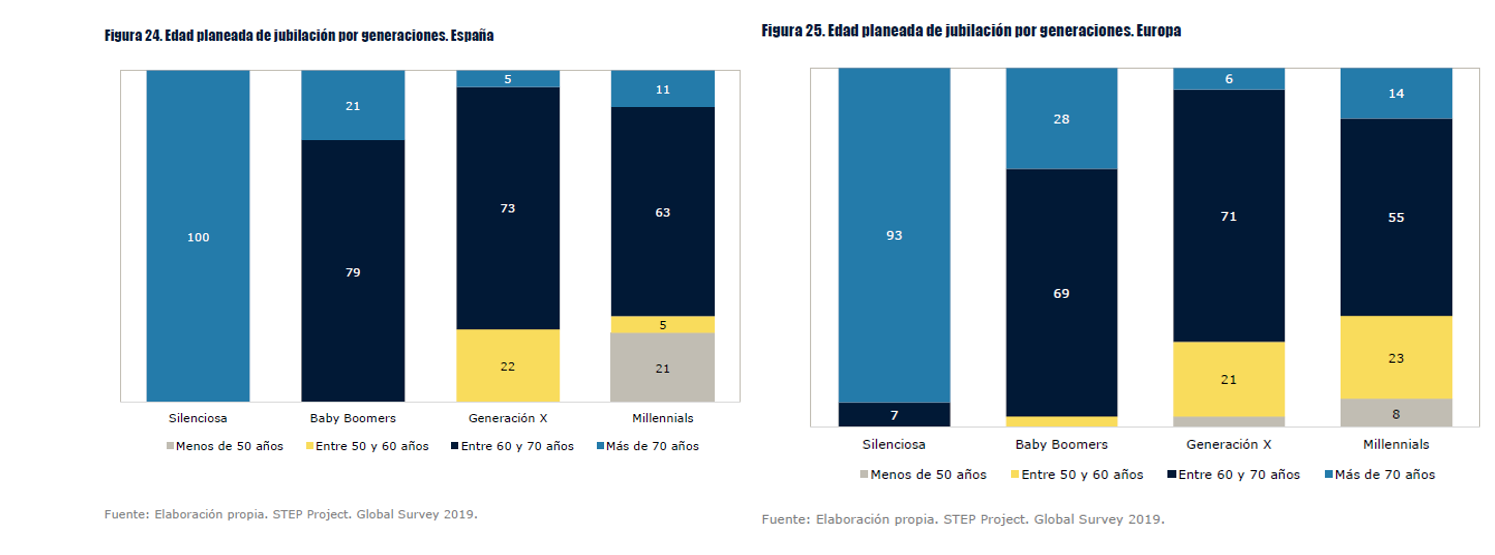
If we compare this data with those of all European companies (Figure 25), we can see that the results are similar. Millennials and Generation X are more willing to retire before 60 years; and almost 30% of the baby boomer generation plans to retire after the age of 70.
The results show that the lengthening of life expectancy does not appear to be substantially delaying the intentions of generational relief among the generations currently in charge (especially the Baby Boomers generation and generation X). In these cases, about 70% of the leaders interviewed say they intend to retire between the age of 60 and 70, although younger people are less predisposed to extend their careers above age 70 (5% of Generation X members, compared to 28% of baby boomers)
The retirement of the company's manager entails a succession process that, from a business point of view, must be done gradually and naturally. Planning this succession helps outgoing managers prepare for their exit, and improves the efficiency of transition processes.
El informe completo puede descargarse aquí
You can check the news published by:
- Europa Press: Más de un 70% de los líderes de las empresas familiares españolas no tiene un plan de sucesión, según un estudio
- El Confidencial Digital: Más de un 70% de los líderes de las empresas familiares españolas no tiene un plan de sucesión
- Castellón Información: EL 70% de las empresas familiares admiten no tener un plan de sucesión
- Levante-EMV: Un 70% de los líderes de las empresas familiares no tiene un plan de sucesión
- BolsaManía: Más de un 70% de los líderes de las empresas familiares españolas no tiene un plan de sucesión
- Diario Siglo xxi: Más de un 70% de los líderes de las empresas familiares españolas no tiene un plan de sucesión








